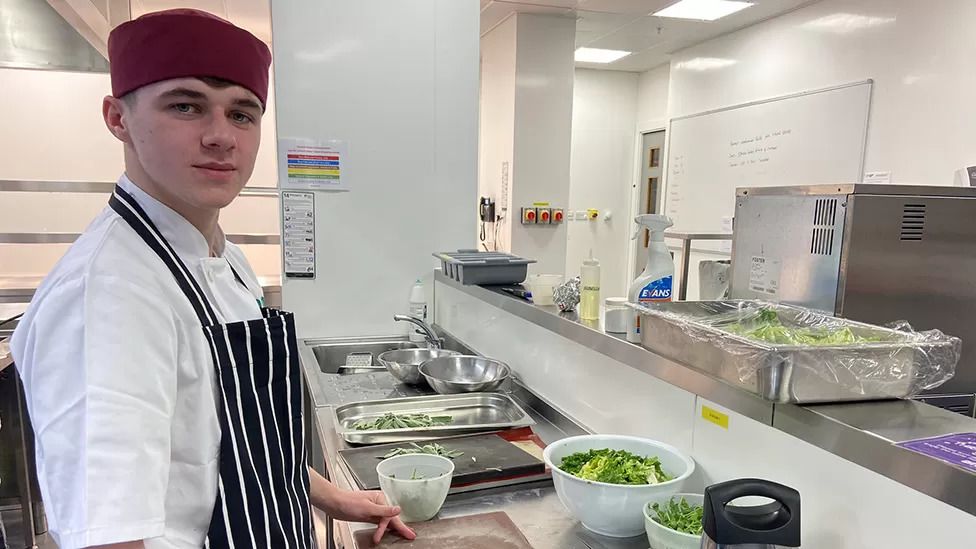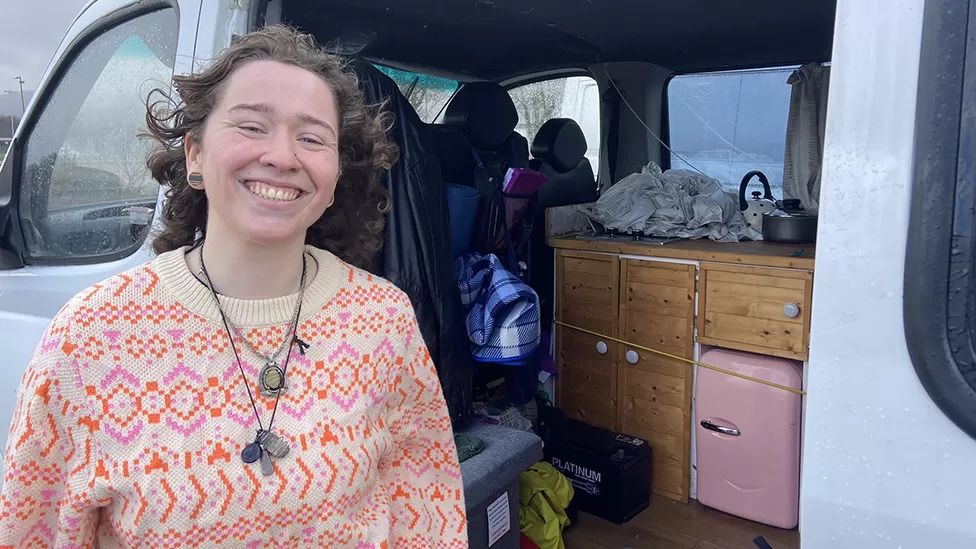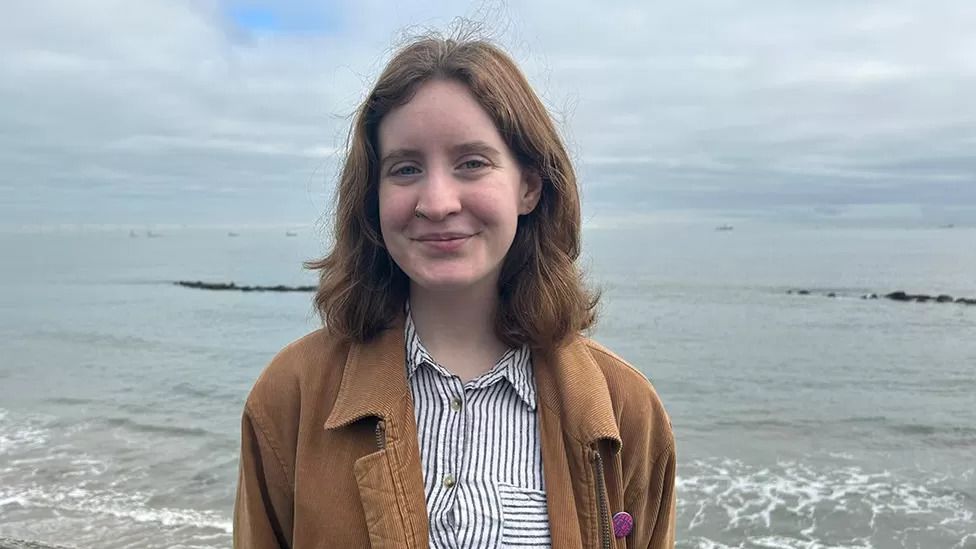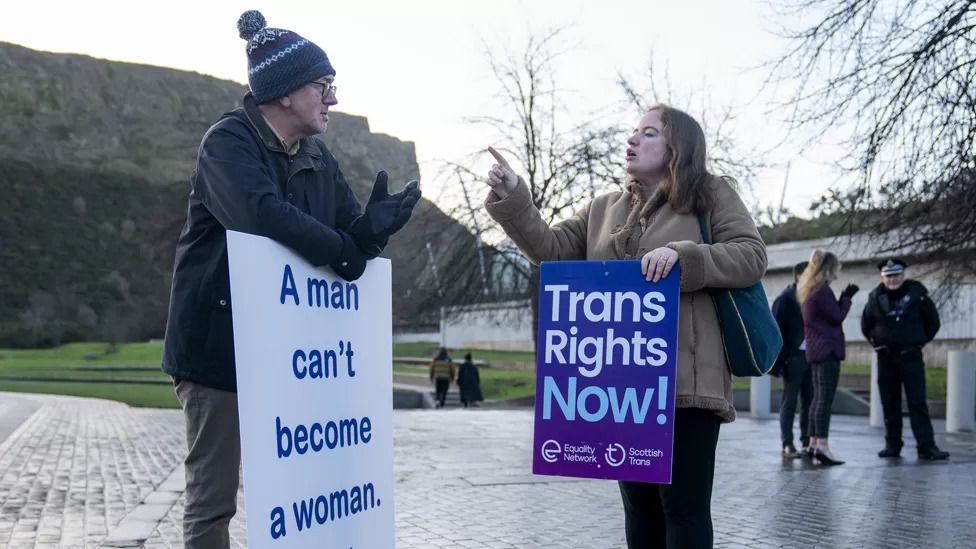
Humza Yousaf: What do young people want from new SNP leader?
He's become the leader of the Scottish National Party (SNP), and the country's first minister.
For many people in their teens and 20s, it's the biggest political change in Scotland in their adult lives.
BBC Newsbeat spent a week speaking to young people across the country to find out what they think about some of the big issues facing the new SNP leader.
Scottish independence
One of the things Nicola Sturgeon was best known for was her desire to make Scotland independent.
That would mean breaking away from the rest of the UK, and giving the government more control over its own laws and political decisions.
Catering student James was 10 years old in 2014, when Scotland held a referendum on becoming independent.
In the end, 55% voted to remain inside the UK and 45% voted for independence.
The 19-year-old says he remembers stickers - Yes or No - depending on which way people planned to vote.
"You still see them now," he says. "Folks still have them on their cars and everything... mostly Yes."
 Catering student James was in primary school at the time of the 2014 referendum
Catering student James was in primary school at the time of the 2014 referendum
Fellow student Megan actually voted in 2014 - rules were changed so 16 and 17-year-olds could have their say.
But does she still care about Scottish independence?
"If that would help with things, then definitely."
Humza Yousaf's said he's pro-independence, but so far he's sounded more cautious than Nicola Sturgeon on the issue.
But it isn't the topic on the minds of most young people Newsbeat speaks to.
Melanie's view is straightforward: "It doesn't interest me at all.
"They need to focus on the prices of stuff. The cost of living's going up far too much and people are struggling far too much."
Cost of living
One person who's definitely felt the cost-of-living crisis hitting her bank account is 21-year-old Jody, from Dundee.
She's now based in Fort William, studying adventure education in the West Highlands and working in a soft play centre.
One big cost Jody's cut down on is rent - she's swapped living in a flat for a 20-year-old Maxus van she now calls home.
"It's a bit raggedy and rusty, but inside it's lovely and has everything I need," she says.
Jody says the van's fridge, small cooker and tiny heater have "definitely helped me to live cheaper".
"The cost of petrol is the only thing I have to really worry about."
 Jody says living in her van has saved her money on rent - but it can get very cold
Jody says living in her van has saved her money on rent - but it can get very cold
Jody she also has to contend with some brutal winter temperatures - something she says she only survived thanks to a sleeping bag onesie her mum bought for her.
She says her experience has highlighted the need for a "balance of what people have and what people need".
Even in Fort William, she says, there are "too many people, not enough houses" and rent costs are too high.
"A lot of people, even adults and older people are living in shared houses," she says.
"That would be good to be sorted."
Climate
Nicola Sturgeon set ambitious climate targets for Scotland - but it's repeatedly missed them.
If he wants to catch up that could mean unpopular decisions for Humza Yousaf.
Especially in places like Aberdeen - the "oil capital of Europe" - where many are employed in the off-shore rigs off the coast.
Jimmy, who talks to Newsbeat while walking his dog along the coast, tells us his dad works off-shore which is not unusual for the area.
"Growing up in Aberdeen you always know somebody who works off-shore so it's certainly an industry that I would say affects everybody in the city and the north-east," he says.
But he's not against changing the way things are done.
"If it's a managed transition I would move towards cleaner and greener energy, I think that's a good thing."
 Climate campaigner Cerys wants the Scottish government to move more quickly on helping the climate
Climate campaigner Cerys wants the Scottish government to move more quickly on helping the climate
Cerys is a member of climate campaign Fridays for Future - a group that's welcomed Humza Yousaf's stance on phasing out fossil fuels in favour of renewables.
She says "oil and gas is something we have to transition away from as quickly as possible".
But Cerys acknowledges that it's "incredibly important that oil workers and their families are supported" in any move away from fossil fuels.
Things are changing - a little further up the coast from Aberdeen you can see a huge wind farm and a new harbour dedicated to supporting green energy.
But for campaigners like Cerys it's not enough.
"Aberdeen could be the renewable energy capital of Europe instead of the oil capital," she says.
"Time is not on our hands here because we've waited so long."
Gender rights
One issue that's dominated coverage of Scottish politics this year has been the row over trans rights.
The Scottish parliament voted to make it easier for people to change their legal gender, but the UK government blocked the move.
Humza Yousaf says he'll challenge the blocking of the bill in the courts, but only if legal advice supports this.
The issue was put back in the spotlight this year when Isla Bryson, a transgender rapist, was jailed for attacking two women before changing gender.
Andi, 27, who identifies as non-binary, spoke to Newsbeat in Lenzie, near Glasgow.
"It's kind of scary to be a trans person in Scotland and also the UK right now," Andi says.
Andi thinks the backlash against the Gender Reform Bill has been a setback for LGBT people.
"It took me a long time to figure out who I was," says Andi. "I think that's because I didn't have people in my life like me and people in Scotland didn't understand it."
 The Gender Reform Bill has generated fierce debate from supporters and opponents
The Gender Reform Bill has generated fierce debate from supporters and opponents
Nicole, 25, from Edinburgh, is opposed to the changes to the gender laws and worries they'll make single-sex spaces like "accommodation, sport and women's refuges" less safe.
This is one of the reasons critics, including high-profile opponents like JK Rowling, say the plans are an attack on women's rights.
Nicole's not convinced by the argument that other countries have relaxed self-identification rules without an increase in attacks on women.
"A lot of the time it's difficult to track because you're recording by gender identity and not sex, then you can't trace the impact," she says.
But Andi says the proposed changes don't put women's rights at risk.
"Those rights are still there, we're not asking to take them away, we're just asking for us to have rights too.
"And if that means adapting something a little bit, that's all we're asking for."
Engaging young voters
Perhaps the biggest challenge for Humza Yousaf will be getting young people to pay attention to politics at all.
Lots of those who spoke to Newsbeat said they didn't bother with it.
"I don't really look at news," catering student James told us. "I only look at it if something big happens."
And Jody, who lives in her van, said: "I find the news quite depressing, quite anxiety-inducing so I try to stay away from it."
But there might be some hope. Remember those 16 and 17 year olds given a vote in 2014? Three and a half million came to the ballot box.
So maybe they can be convinced to come back again.










